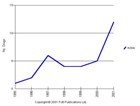Pharmaprojects reports a boom in the development of new types of antidepressants

Pharmaprojects data shows that, as recognition of this illness improves and the market for antidepressants subsequently increases, there has been a steady rise over the past six years in the number of antidepressant drugs in active development, from 97 in 1995 to the current total of 138. A closer look at the data shows that the field of antidepressant research is still dominated by those compounds that modulate monoamine activity, such as the 5-hydroxytryptamine uptake inhibitors (SSRIs). Drugs of this class, such as Lilly's blockbuster Prozac, are currently the most frequently prescribed antidepressants, and are considered safer than the older tricyclic antidepressants and have good efficacy. However, these drugs often take several weeks before their therapeutic effect is seen, and not all patients respond to them. Since approximately 30% of the population do not respond to any of the current therapies available, the search for new treatments must continue.
Accordingly, there has been increasing interest in recent years in newer strategies, particularly the regulation of neuropeptides such as neurokinin-1 (substance P) and corticotrophin-releasing factor. In total, the number of different strategies currently being employed to develop antidepressant drugs has risen to 52.

Figure 1 - Substance P and corticotrophin releasing factor antagonists in active research for depression
Merck and Co's substance P inhibitor MK-869, was the first drug not directly related to monoamine transmission to show efficacy in depression. Although development for this compound as an antidepressant has now been suspended, its discovery highlighted the importance of neuropeptides in depression and paved the way for further research in this area by many other companies. Pharmaprojects data clearly shows a sharp rise in Substance P and corticotrophin-releasing factor antagonists in development for depression (Figure 1). With a number of these drugs now in Phase I or II development, the future is looking bright for the treatment of depression.
World Mental Health Day is an occasion now recognised by over 100 countries. Organised by the World Federation for Mental Health, it is promoted as an opportunity to raise awareness about mental disorders to the general public, dispelling the stigma which often clouds public perception, as well as to share accurate information about available treatment options. This year, as with last year's event, the theme for the day is "Mental Health and Work".
Clinical depression, just one of the many disorders covered by the term mental health, is an illness that now affects one in 10 working-age adults in the US, resulting in a loss of approximately 200 million working days per year. Similarly, one in every 20 working-age Britons can expect to suffer from major depression. With prevalence of the illness so high and the financial costs to employers so great, there is an obvious need for effective treatments.
About Pharmaprojects
Pharmaprojects, the leading database tracking pharmaceutical development from early preclinical study through to launch or discontinuation, has 21 years experience as an information provider to the industry. Pharmaprojects uses a fully-searchable application that allows you to pinpoint the specific information you are looking for whether it be comprehensive drug profiles, a competitor's pipeline or licensing opportunities. Updated monthly, the data is also available weekly via online hosts PJB Publications, Dialog and Datastar, Ovid Technologies and STN International.
Pharmaprojects R&D Time-Lines is the definitive R&D benchmarking resource tool that allows you to measure the probability of a drug's success through each phase of development and estimate how long it will take a drug to reach the market.
The Pharmaprojects team is available for comment or to provide presentations on trends in pharmaceutical R&D; for details, please contact Ian Lloyd, Managing Editor.
About PJB Publications
PJB Publications, established in 1976, is an independent publishing company of business-to-business information. Specialist areas of knowledge include pharmaceuticals on which it publishes the twice-weekly newsletter Scrip, medical devices and diagnostics, biotechnology, veterinary, crop protection, agribusiness, clinical research and regulatory affairs.
